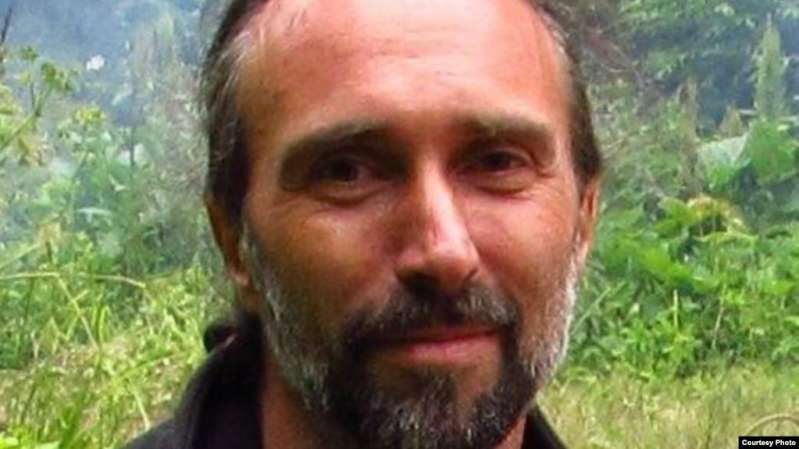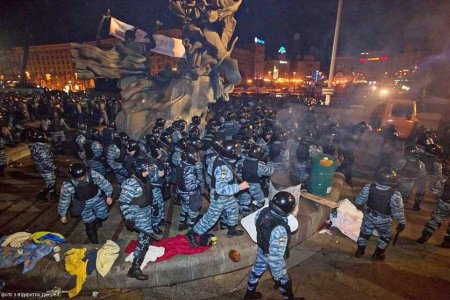
A court in Kyiv has found Oleksandr Medvid guilty of abducting Yury Verbytsky from hospital during the Euromaidan protests on 21 January 2014, but waived a term of imprisonment by refusing to consider the 51-year-old Maidan activist’s death after savage torture from his abductors a direct and grave consequence of that treatment.
Yury Verbytskyy was a seismologist from Lviv who had come to Kyiv to join the Euromaidan protests now known as the Revolution of Dignity. He had sustained an eye injury during the conflict on Maidan and was taken to hospital by Ihor Lutsenko, a well-known journalist and civic activist. Both Verbytskyy and Lutsenko were abducted from the hospital during the early hours of 21 January 2014 by up to 10 men in plain clothes. Lutsenko survived, and has explained that the two men were originally taken to a garage where they were questioned by unidentified Russian‑speaking individuals about their involvement in the Maidan protests. While Lutsenko answered in Russian, Verbytskyy spoke Ukrainian. Lutsenko spoke of Verbytskyy receiving particularly savage treatment from their abductors because of his being from Lviv.
Verbytskyy’s body was soon afterwards found in a forest outside Kyiv. While the Interior Ministry at the time (which was still under people close to the then President Viktor Yanukovych) claimed that the cause of death was hyperthemia, MPs from the opposition made the findings of the forensic autopsy known. That found multiple injuries, damage to soft tissue and bruising all over his body, including to the chest, abdomen, face and skull, as well as multiple rib fractures and breakages. Even if he died of hyperthemia, that was because he had been unable to move from where he was dumped because of the injuries.
Oleksandr Medvid is one of several men later arrested over the abduction, with all of them believed to have been so-called ‘titushki’, or government-paid thugs from Bila Tserkva in Kyiv oblast. His trial, heard at the Shevchenkivsk District Court in Kyiv under presiding judge Lidia Shebunyaeva, ended with his conviction on 3 April, but only after the judge made a major charge to the indictment. The public prosecutor had laid charges against Medvid under Article 146 § 3 of Ukraine’s Criminal Code (unlawful deprivation of liberty or abduction, with these carried out by an organized gang, or which resulted in grave consequences. Judge Shebunyaeva instead changed the charge to Article 146 § 2 (abduction, if carried out against a minor; for mercenary motives; against two or more people or by prior conspiracy; or in a manner dangerous for the life and health of the victim; or which involved the victim being subjected to physical suffering …). Medvid was initially charged under Article 146 § 2, however this was changed to the more severe Article 146 § 3 in 2021, and prosecutor Yulia Malashych has already said that she will be appealing against the change in indictment and the effective lack of a custodial sentence. Medvid also asserted that he planned to appeal and denied any involvement in the abduction.
The court had accepted that Medvid was guilty of the abduction of the two men according to prior conspiracy and that he had inflicted physical pain. It did not, however, believe it proven that the grave consequences, namely Verbytskyy’s death had been the result of the abduction and the physical pain inflicted. The torture had resulted in Verbytskyy being able to move freely, with the fact that he couldn’t move exposing his organism still further to the adverse effect of the low temperature. The reason for denying the direct link between Medvid’s actions and Verbytskyy’s death appears to have been the line of argument that, had it been warmer, Verbytskyy’s motionless state due to the many injuries would not, in itself have killed him.
According to the Advocacy Advisory Panel, this is the fourth verdict passed over the abduction and killing of Verbytskyy and abduction of Ihor Lutsenko. It looks set to become the second verdict which is under appeal.
The first is probably over the sentence passed in April 2021 on Oleksandr Volkov. He was accused of organizing the abduction, torture and deliberate murder of Verbytsky, and of Lutsenko’s abduction and torture. While prosecutor Malashych asked for a full conviction and 13-year sentence, the court (under judges Yury Kabaniachy (presiding); Yevhen Borets and Ilona Muranova-Lesiv) found Volkov guilty of organizing, via prior conspiracy, the abduction and torture with grave consequences of the two men and sentenced him to nine years. On that occasion also the court, however, changed the charge of organizing the deliberate killing of Verbytsky to one of having left Verbytsky without help, with this having caused his death (Article 135 § 3 of Ukraine’s Criminal Code). It further acquitted Volkov of the charge of having created a criminal gang. He was found guilty of having obstructed peaceful assembly, but freed from liability as this crime was time-barred.
The court also ruled, controversially, that the 9-year sentence would be in accordance with the so-called ‘Savchenko law’, which equates one year in a SIZO, or remand prison where the conditions are considerably worse, to two days in a prison colony. This means that, even if the sentence is upheld at appeal stage, Volkov will be counted as having already served the majority of the sentence..
On 21 January 2021, exactly seven years after Verbytsky’s abduction, the European Court of Human Rights issued five damning judgements, finding Ukraine in violation of multiple rights, including the right to life, to liberty and security and the prohibition of torture.
In the Case of Lutsenko and Verbytskyy v. Ukraine, the Court in Strasbourg found that there had been violations of Article 2 of the European Convention on Human Rights (the right to life), both with respect to the murder itself, and to the authorities’ failure to carry out an effective official investigation. It also found that there had been violations of Articles 3 (the prohibition of torture); 5 § 1 (the right to liberty and security) and 11 of the Convention “on account, in particular, of the ill-treatment and persecution of the first applicant and the torture and death of the second applicant’s brother as a result of their implication in the Maidan protests. The Court also concluded that much of the abuse was committed by non-State agents who acted with the acquiescence if not the approval of the authorities and that to date no independent and effective official investigation has been conducted into these matters.”



